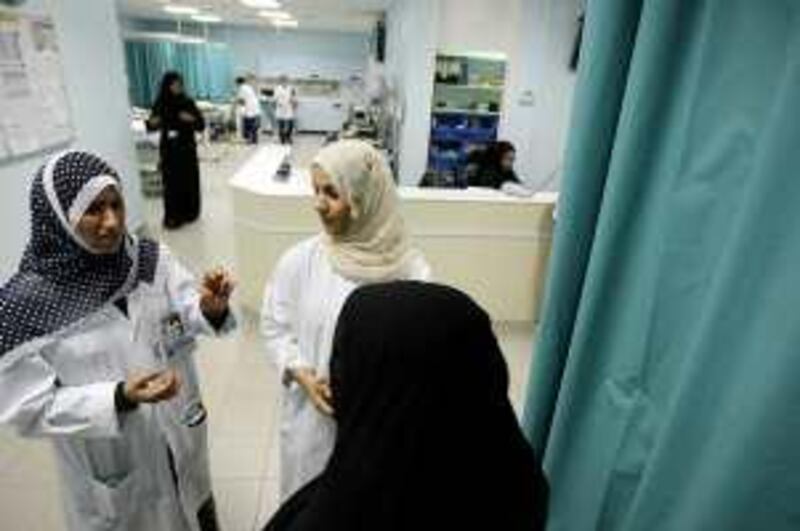DUBAI // Breast cancer tends to run in families, something Leila Ashawab knows all too well. The 49-year-old has already had the disease, and after the recent discovery of a second lump, fears she may have it again. She is also concerned for her three daughters, ages 16 to 25, but cannot tell if they really understand what is at stake.
"I've told them to take care of their diets and their lifestyles, and that they should go for routine check-ups all the time," she said. "They don't tell me if they're afraid of the risks; maybe they hide it from me." Dr Zaid al Mazam, the head of the breast cancer unit at Rashid Hospital and one of the doctors working with Mrs Ashawab, stressed the importance of early, preventive health measures.
"You cannot decrease the number of cases without planning the future," he said. "In the US and the UK, awareness, diet and exercise started a long time ago. They are aware of the risks with fatty foods, lack of exercise and so on. Here the awareness is low and needs to be focused on." Rashid Hospital was the first hospital in the UAE to establish a unit dedicated solely to breast cancer, in 2004. Last year the facility launched an awareness campaign at malls and colleges, ahead of this year's decision by the Ministry of Health to introduce mandatory mammograms for women aged 40 to 69.
Breast cancer, which usually attacks the inner lining of the milk ducts, is the second most common type worldwide, after lung cancer. According to the World Health Organisation, breast cancer is increasing, especially in European countries, where it is said to affect one in 16 women. It is the most common form of cancer in the Emirates, where 44 per cent of diagnoses are fatal, according to the Health Authority-Abu Dhabi.
Dr Mouza al Hattawi, a registrar in Rashid Hospital's breast cancer unit, said there had been a 50 per cent increase in the number of women coming to it - as many as 40 to 50 a week. "There has been a dramatic increase, around 80 per cent, in the last 10 years, starting from the late 1990s," said Dr Essaf Barahma, a consultant at the unit. "This includes not only the Gulf, but Iraq and Iran as well, and we've noticed that it is affecting women as young as 28 or 29 years of age."
Dr al Mazam is advising that women in their early 20s be educated on how to administer self-examinations. They should also get screened every three years, he added. "We get cases of all ages - the youngest here being 24 years old," he said. "It is important for every woman to be aware of the risks." The hospital recently introduced two methods of early detection that have yet to be implemented in the rest of the Gulf: ductoscopies and vacuum-assisted biopsies. A ductoscopy involves using a tiny camera to examine the breast's interior.
"It shows us what is going on and if there are any abnormalities," Dr Hattawi said, explaining that it allowed doctors to remove lumps at an early stage. "At a later stage, the cancer is already travelling through the body and bones, and it is too late to do surgery." nsamaha@thenational.ae





